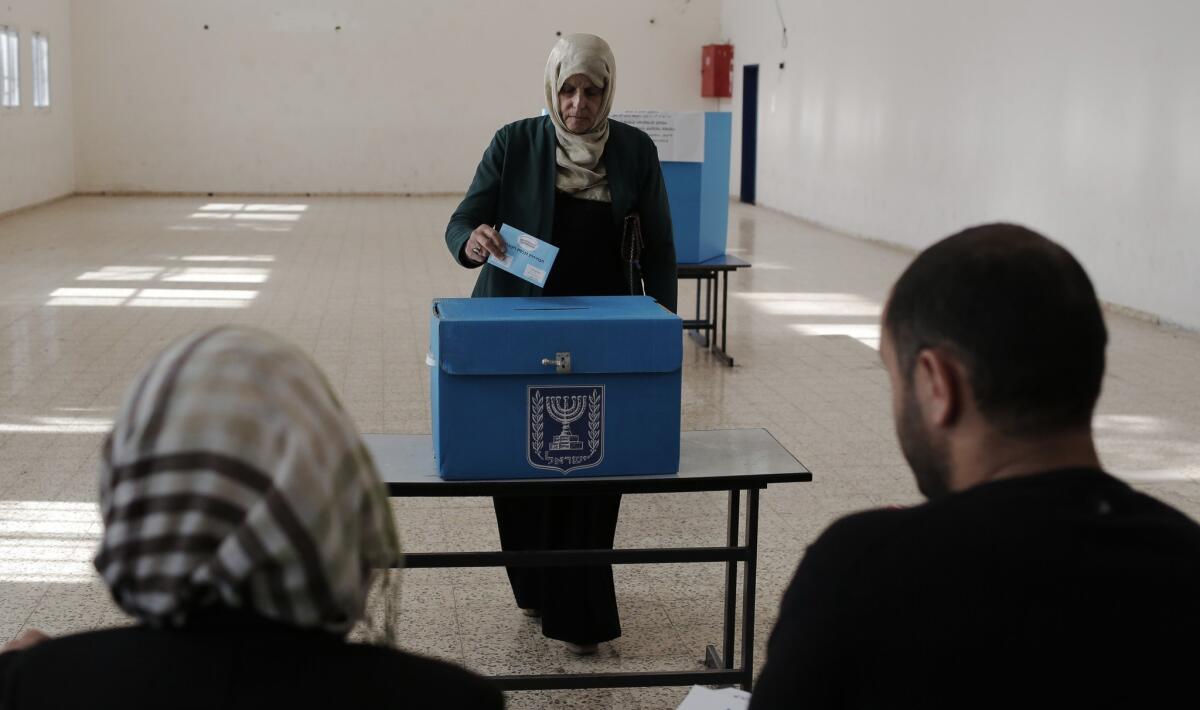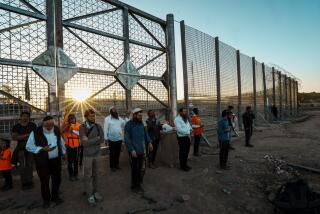Opinion: They’re Palestinians, not ‘Israeli Arabs’

An Israeli citizen casts her ballot at a polling station in the northern town of Umm al-Fahm on March 17.
Can you imagine reading an editorial in a respected newspaper today discussing the rights of “Negroes” or “Chinamen”? Probably not. And yet, like other newspapers in this country, The Times continues to use the generic term “Arabs” or “Israeli Arabs” to refer to the Palestinians who live inside Israel, falsely distinguishing them from the Palestinians who live in the territories occupied by Israel in 1967 or those who were driven into exile during the destruction of Palestine in 1948.
The term is, at best, an archaism from the mid-20th century that Palestinians themselves resist using. Using it is akin to using “Negroes” or “Coloreds” instead of “African Americans” or calling Asians “Orientals.” In general, the term that an ethnic or national group uses to designate itself is surely preferable to the terms that its antagonists have historically used to designate it.
But what’s at stake here is not merely rhetoric but a form of historical distortion that makes it all but impossible for readers to fully grasp the nature of the conflict.
Palestinian artists and intellectuals as well as the most important institutions of Palestinian civil society inside Israel, including the human rights organization Adalah and the Mada al-Carmel research center, use the term “Palestinians” to identify and affiliate themselves and to assert their indissoluble connection to the rest of the Palestinian people.
In 2007, Adalah drafted a constitution for what it envisages as a genuinely multicultural and truly democratic state of Israel (i.e., not the state as it actually exists, which treats Palestinians as second-class citizens). It states, for example, “The Palestinian Arab citizens of the State of Israel have lived in their homeland for innumerable generations. Here they were born, here their historic roots have grown, and here their national and cultural life has developed and flourished. They are active contributors to human history and culture as part of the Arab nation and the Islamic culture and as an inseparable part of the Palestinian people.” Mada al-Carmel’s Haifa Declaration — the single most important collective declaration of and by the Palestinians inside Israel — similarly states, “We, sons and daughters of the Palestinian Arab people who remained in our homeland despite the Nakba, who were forcibly made a minority in the State of Israel after its establishment in 1948 on the greater part of the Palestinian homeland; do hereby affirm in this Declaration the foundations of our identity and belonging, and put forth a vision of our collective future, one which gives voice to our concerns and aspirations and lays the foundations for a frank dialogue among ourselves and between ourselves and other peoples.”
As these declarations remind us, the Palestinians inside Israel are the remnant of the Palestinian people who survived the ethnic cleansing of Palestine in 1948, when the majority of the country’s Muslim and Christian population was driven into exile in what Palestinians call the Nakba. As Adalah puts it most succinctly, their political status “was changed against their will, making them a minority in their homeland.” Adalah adds, “they did not relinquish their national identity.”
This is not merely assertion on the part of these institutions (though, frankly, even if it were, that would be enough to take it seriously); the destruction of Palestine and the dispersal of the Palestinian people is a matter of the historical record established by Israeli, Palestinian and other scholars, which only a last few scattered apologists for Israel continue to question.
Just as Palestinians existed as a people before the dismemberment of their homeland, they continue to exist as a people afterward. To refer to some Palestinians as Palestinian and others merely as deracinated “Arabs” is to doubt or negate their claim to a national existence as a people both historically and in the present. And in any case, it’s not up to The Times — or anyone else — to determine who counts as Palestinian and who doesn’t.
In fact, to use the ethnic term “Arab” to describe the Palestinians inside Israel is to strip them of any national identity — not only the national identity that they themselves assert, but quite literally any national identity whatsoever, given that, according to a 2013 ruling of the Israeli Supreme Court, “Israeli” is not a national identity. (For all its loose talk of democracy, Israel considers itself, after all, the state of the Jewish people rather than the state of its actual citizens or of those over whom it rules.) To reduce and describe people merely as an ethnicity shorn of national identity is, even if implicitly, to negate their political identity and to deny their rights, which, especially in this case, has very disturbing implications.
Moreover, to use different designations for the Palestinians inside Israel and the Palestinians in the occupied territories and in exile is to obscure, if not to deny altogether, the unity and continuity of the Palestinian people. The fact that the Palestinians inside Israel are an integral part of the Palestinian people is absolutely central to the history of this conflict as well as key to its resolution. Times readers will have no way of knowing that, given the newspaper’s use of different designations for different parts of the Palestinian people.
Finally, and most importantly, Palestinians themselves — those inside Israel and those in the occupied territories and around the world — have asserted their identity as a people. It’s unacceptable to deny or at best ignore these assertions, to look the other way, or pretend not to hear, when a people insists that they are a people and that they have a right to freedom and a will to be free.
Saree Makdisi, a professor of English and comparative literature at UCLA, is the author of “Palestine Inside Out: An Everyday Occupation.”
This piece is part of Blowback, our online forum for rebuttals to The Times. If you would like to write a full-length response to a recent Times article, editorial or op-ed and would like to participate in Blowback, here are our FAQs and submission policy.
Follow the Opinion section on Twitter @latimesopinion and Facebook
More to Read
A cure for the common opinion
Get thought-provoking perspectives with our weekly newsletter.
You may occasionally receive promotional content from the Los Angeles Times.






